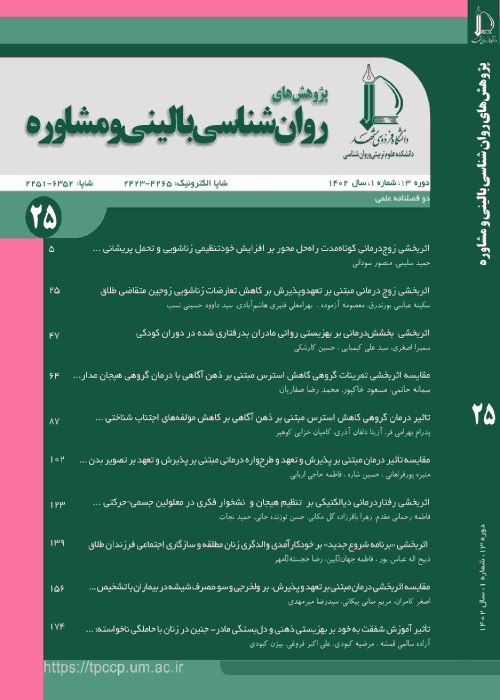The Effectiveness of Solution-Focused Brief Couple Therapy on Increasing Couples’ Marital Self-Regulation and Emotional Distress Tolerance
Family as a dynamic system embraces a number of subsystems, the most important of which is spouse subsystem. Couple’s ability in marital self-regulation is a significant factor determining the quality of their interactions. Marital self-regulation refers to the ability of couples to change their beliefs, emotions, and behaviors. It has two dimensions: communication regulation and communication effort. The ability of adapting needs, preferences, and expectations to spouse determines the ability of couples in marital self-regulation. Another determining factor governing couples’ relationship is emotional distress tolerance. According to Simons and Gaher (2005), distress tolerance consists of four aspects of tolerance, appraisal, absorption, and regulation. Distress tolerance is defined as the ability of experiencing and tolerating negative and stressful internal and environmental discomforts. Tavares and Aassve (2013) showed that low distress tolerance is related to poor marital relationship and is a factor of failure in marriage. Solution-focused approach has been taken by some therapists for a variety of family therapies, people with mental disabilities, domestic violence, people with substance abuse disorders, marital intimacy, and sexual disorders. This approach has been proved to be effective. Since couples’ inability to tolerate marital distress and self-regulation causes disturbed marital interactions, this study was conducted to answer the following question: Does the effect of short-term solution-focused couples therapy on couples’ increasing marital self-regulation and emotional distress tolerance and its components last to the one-month follow-up stage?
This semi-experimental study used a pre-test, post-test, follow-up design. The statistical population includes all couples who visited private and government counseling centers in Ilam city in 2021. Purposive sampling method was used and participants were randomly divided into experimental and control groups. Considering the inclusion and exclusion criteria, from among 25 volunteered couples (50 people), 12 couples (6 couples for experimental group and 6 couples for the control group, totally 24 people) were selected. Moreover, the treatment was conducted in 36 sessions, 90 minutes every session (6 sessions for each couple).Marital Self-regulation Questionnaire and Distress Tolerance Scale were used as the instruments of the study. Marital self-regulation questionnaire (behavioral self-regulation for effective relationships scale) was developed by Wilson et al. (2005). This questionnaire consists of 16 items that evaluate communication regulation and communication effort. The Distress Tolerance Scale is a 15-item self-report measure of emotional distress tolerance developed by Simons and Gaher (2005). This questionnaire consists of four subscales of tolerance, appraisal, absorption, and regulation. Data were analyzed using descriptive and inferential statistics (ANCOVA).
The results of univariate covariance analysis for the post-test scores of marital self-regulation components showed that F for communication regulation is 381.374 (p<0.001) and communication effort is 248.74 (p<0.001). These results show that there is a significant difference between experimental and control groups regarding communication effort and communication regulation among couples in the post-test stage, and short-term solution-focused treatment improves couples’ communication effort and communication regulation. Moreover, F ratio of univariate covariance analysis for communication self-regulation (F=442.521 and p<0.001) and communication effort (F=779.855 and p<0.001) indicates the persistence of the effectiveness of this treatment until follow-up stage. The results of univariate covariance analysis on post-test scores of distress tolerance components for couples show that F ratio for tolerance is 8.262 (p<0.001), for absorption is 280.05 (p<0.001), for appraisal is 230.37 (p<0.001), and for regulation is 0.800 (p=0.383). The results of univariate covariance analysis on follow-up scores of distress tolerance components show that F ratio for tolerance is 622.403 (p<0.001), for absorption is 753.943 (p<0.001), for appraisal is 237.887 (p<0.001), and for regulation is 0.047 (p=0.831), which show the persistence of the effectiveness of the treatment until the follow-up stage.
This study aimed to investigate the impact of short-term solution-focused couple therapy on improving couples’ marital self-regulation and distress tolerance and their components. The results showed that this treatment had a significant impact on improving the aspects of couples’ marital self-regulation and tolerating general distress, and this impact lasts until the follow-up stage. But the effectiveness of this treatment was not confirmed for couples’ emotion regulation regarding distress tolerance. One can say that, through adopting a positive position and focusing on the present and future, solution-focused treatment can creates hope in couples. This therapy endeavors to guide couples towards a more compatible life by focusing on and identifying couples’ internal and external capabilities.
- حق عضویت دریافتی صرف حمایت از نشریات عضو و نگهداری، تکمیل و توسعه مگیران میشود.
- پرداخت حق اشتراک و دانلود مقالات اجازه بازنشر آن در سایر رسانههای چاپی و دیجیتال را به کاربر نمیدهد.




